Aegean architecture - Study guides, Class notes & Summaries
Looking for the best study guides, study notes and summaries about Aegean architecture? On this page you'll find 33 study documents about Aegean architecture.
Page 2 out of 33 results
Sort by
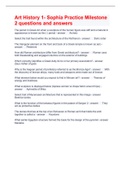
-
Art History 1- Sophia Practice Milestone 2 questions and answers
- Exam (elaborations) • 1 pages • 2023
- Available in package deal
-
- $7.99
- + learn more
Art History 1- Sophia Practice Milestone 2 questions and answers The period in Greek Art when a sculpture of the human figure was stiff and unnatural in appearance is known as the ( ) period Archaic Select the trait found within the architecture of the Parthenon Doric order The triangular element on the front and back of a Greek temple is known as a(n) Pediment How did Roman architecture differ from Greek architecture? Roman uses both freestanding and engaged columns on...
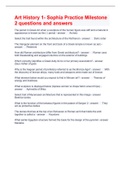
-
Art History 1- Sophia Practice Milestone 2 questions and answers
- Exam (elaborations) • 1 pages • 2023
- Available in package deal
-
- $9.99
- + learn more
Art History 1- Sophia Practice Milestone 2 questions and answers The period in Greek Art when a sculpture of the human figure was stiff and unnatural in appearance is known as the ( ) period Archaic Select the trait found within the architecture of the Parthenon Doric order 00:52 01:15 The triangular element on the front and back of a Greek temple is known as a(n) Pediment How did Roman architecture differ from Greek architecture? Roman uses both freestanding ...
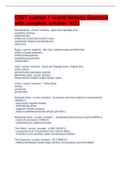
-
CSET subtest 1 (world history) Question with complete solution 2023
- Exam (elaborations) • 10 pages • 2023
- Available in package deal
-
- $14.49
- + learn more
CSET subtest 1 (world history) Question with complete solution 2023Mesopotamia tigris and euphrates river cuneiform (writing) organized gov. written law code (hammurabi's code) systemized religion (zoroastrianism) astronomy Egypt Nile river, mediterranean and Red Sea religion of gods (pharaoh) writing (hieroglyphics) engineering (pyramids) mathematics India Indus and Ganges rivers, Arabian Sea urban culture planned cities (sanitation system) Metallurgy (gold, copper...
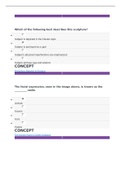
-
Sophia Art History 1 Milestone 2 (Solutions)|Art history 1 Unit 2 Milestone Sophia Course
- Exam (elaborations) • 15 pages • 2022
-
- $13.49
- + learn more
Which of the following characteristics are present in this image from Chauvet Cave? Descriptive point of view, votive figure Abstraction, descriptive point of view Votive figure, megalithic Megalithic, abstraction CONCEPT Cave Painting 4 Which of the following statements regarding the Roman use of concrete as a building material is FALSE? Concrete required the use of less-skilled labor. Concrete was cheaper than cut stone. Concrete was more difficu...
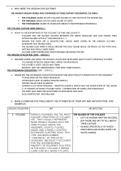
-
Uncovering the Marvels of Aegean Architecture: An Introduction to the History and Style of Aegean Civilization
- Summary • 7 pages • 2023
-
- $8.89
- + learn more
This document offers a fascinating insight into the architecture of the Aegean civilization, one of the most influential civilizations in the history of architecture. Through a detailed examination of the historical context, cultural influences, and key characteristics of Aegean architecture, this document sheds light on the unique style and design of the structures produced by this ancient civilization. From the intricately decorated palaces of Knossos to the towering citadels of Mycenae, this ...

-
HIEU 201 chapter 1,2,3,4,5,6,7,8,9 &10 quiz latest solution
- Exam (elaborations) • 56 pages • 2023
-
- $18.99
- + learn more
1 Paleolithic religious beliefs a. did not include belief in life after death. b. centered around the idea that human beings needed to appease the forces of nature. c. centered around the idea that forces of nature had been created to serve human beings. d. made a clear distinction between nature and the supernatural. Which of the following is NOT a feature of the Neolithic Age? a. Human beings established villages. b. Human beings...

-
HIEU 201 chapter 1,2,3,4,5,6,7,8,9 &10 quiz complete solution
- Exam (elaborations) • 56 pages • 2023
-
- $18.69
- + learn more
1 Paleolithic religious beliefs a. did not include belief in life after death. b. centered around the idea that human beings needed to appease the forces of nature. c. centered around the idea that forces of nature had been created to serve human beings. d. made a clear distinction between nature and the supernatural. Which of the following is NOT a feature of the Neolithic Age? a. Human beings established villages. b. Human beings...

-
HIEU 201 chapter 1-10 complete test
- Exam (elaborations) • 56 pages • 2023
-
- $14.49
- + learn more
1 Paleolithic religious beliefs a. did not include belief in life after death. b. centered around the idea that human beings needed to appease the forces of nature. c. centered around the idea that forces of nature had been created to serve human beings. d. made a clear distinction between nature and the supernatural. Which of the following is NOT a feature of the Neolithic Age? a. Human beings established villages. b. Human beings...
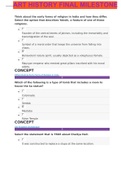
-
art history final milestone,100% CORRECT
- Exam (elaborations) • 14 pages • 2022
-
- $14.49
- + learn more
Think about the early forms of religion in India and how they differ. Select the option that describes Yakshi, a feature of one of these religions. • Benevolent nature spirit, usually depicted as a voluptuous female. • Mauryan emperor who erected great pillars inscribed with his moral edicts. • Founder of the central tenets of Jainism, including the immortality and transmigration of the soul. • Symbol of a moral order that keeps the universe from falling into chaos. 2 Which of the follow...
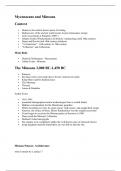
-
Lecture notes on Minoan and Mycenaean civilisation - before 'Ancient Greece'
- Class notes • 4 pages • 2024
-
- $8.45
- + learn more
These notes provide a comprehensive overview of the Mycenaeans and Minoans, two ancient civilisations that thrived in the Aegean region. Here's a summary of the key points covered: 1. Context: The rediscovery of the ancient world in post-Renaissance Europe led to early excavations and scholarly pursuits. Figures like Homer, Johann Jochim Winckelmann, and Stuart and Revett played significant roles in this rediscovery. 2. Minoans: Arthur Evans played a crucial role in uncovering the Minoan ...

Do you wonder why so many students wear nice clothes, have money to spare and enjoy tons of free time? Well, they sell on Stuvia! Imagine your study notes being downloaded a dozen times for $15 each. Every. Single. Day. Discover all about earning on Stuvia


